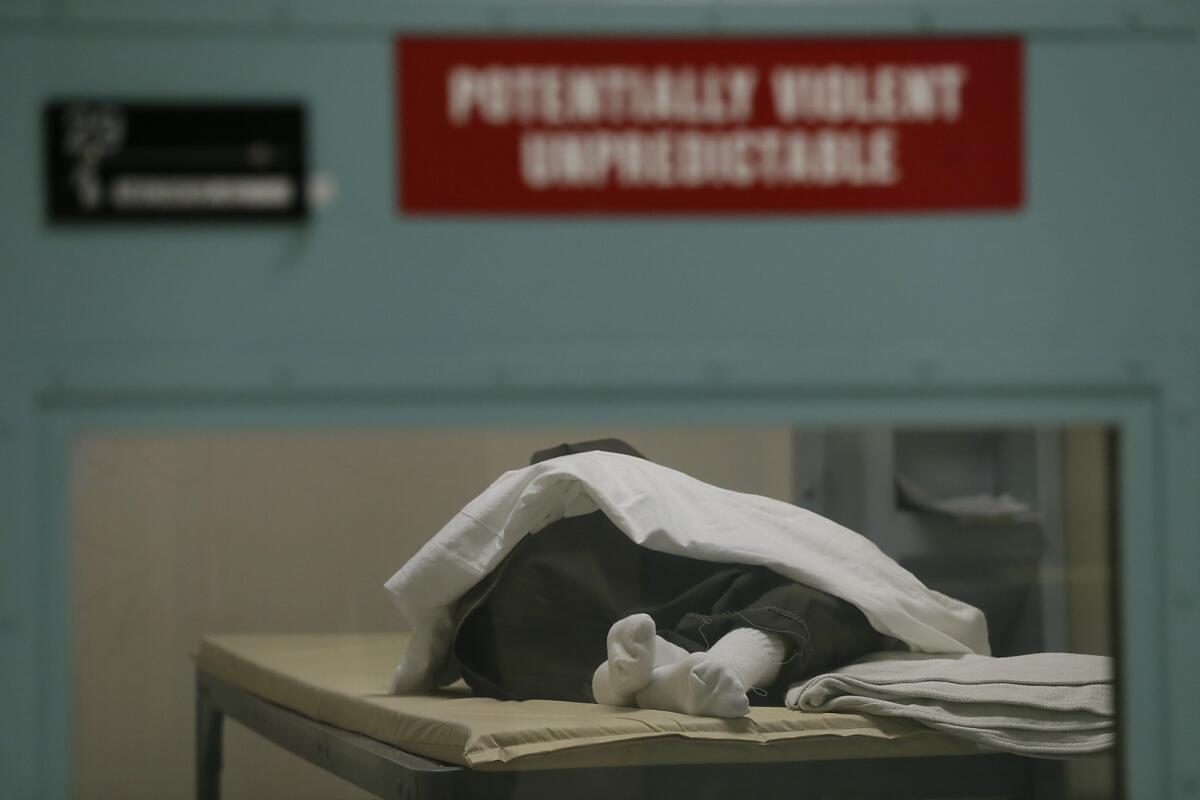Report on increase in mental competency cases leaves many unanswered questions

- Share via
Misdemeanor cases filed by city attorneys are driving a surge in competency cases that is overwhelming Los Angeles County’s mental health court, according to a preliminary report released Wednesday.
The report suggests that the increase might be linked to the county’s rising homeless population, to criminal justice reform measures that may have resulted in fewer people participating in mandated treatment programs, and to the scarcity of psychiatric hospital beds.
But it leaves more questions than answers, and the authors say they need to do more work.
County supervisors ordered an analysis after The Times reported that the number of cases referred to mental health court to determine defendants’ competency had swelled from 944 in 2010 to 3,528 in 2015.
It has strained the resources of the court system and led to a backlog of defendants being evaluated and sent to treatment facilities.
The report, released by a working group headed by the county’s Office of Diversion and Reentry, found that while felony case referrals had increased some, the number of misdemeanor cases had skyrocketed.
In 2010, 225 of the competency referrals were misdemeanor cases filed by city attorneys; in 2015, the number was up to 2,178. It was unclear whether the increase resulted from city attorneys filing more misdemeanor cases or from more defendants being flagged by defense attorneys as potentially incompetent.
The report did not specify what the defendants had been charged with, but noted, “It is likely that a large number of these misdemeanor defendants are homeless, as many of their alleged misdemeanor crimes are often associated with homelessness, such as trespassing and other quality of life offenses.”
It also attributed some of the increase to a greater awareness of mental health issues on the part of defense attorneys, and to the increasing number of mental health patients who appear to be using methamphetamine.
But the report authors said these were likely secondary to a pair of changes in state law that altered the landscape of the criminal justice system: AB 109, which passed responsibility for supervising many nonviolent felons from the state to the county, and Proposition 47, which downgraded several drug and property crimes from felonies to misdemeanors.
The changes may have had the “unintended consequence” of ending post-release support services and court-mandated drug and alcohol treatment for many offenders with mental health and substance abuse issues, the group said.
The report also pointed to the shrinking number of beds available for acute psychiatric care as a major contributing factor.
Statewide, the number of psychiatric beds decreased by 30% between 1995 and 2010, according to the California Hospital Assn. The number of public acute psychiatric care beds has remained flat at 101 in Los Angeles County over the last five years.
The report recommended expanding court-ordered mental health treatment and building more acute and subacute beds and “structured housing options” for people with acute mental illness.
“If beds are not created, we will continue to see increased numbers of persons with severe mental disorders in jail and in the court system,” the authors wrote.
At a meeting Wednesday, staff for some of the county supervisors questioned the assertion that AB 109 and Proposition 47 were major driving factors and asked for more information on the timing of the increases.
The authors of the report said they would do more research and come back in a month with a final document.
Advocates with the National Alliance on Mental Illness said the report confirms an assertion they have made for years: that a shrinking inpatient mental health system is funneling people with serious mental illness into the jails.
“Imagine if we had another 100 acute beds -- do you think we’d make a dent in the incompetent-to-stand-trial population?” said Mark Gale, criminal justice chairman for the L.A. County Council of the alliance. “I think so.”
See the most-read stories this hour >>
ALSO
Several arrested after Trump supporters and opponents square off at rally in Anaheim
Condoms, tampons and feces: Oregon fraternity suspended after ‘disgraceful’ trashing of Shasta Lake
California to audit Alliance charter schools after anti-union allegations
Twitter: @sewella
More to Read
Sign up for Essential California
The most important California stories and recommendations in your inbox every morning.
You may occasionally receive promotional content from the Los Angeles Times.











